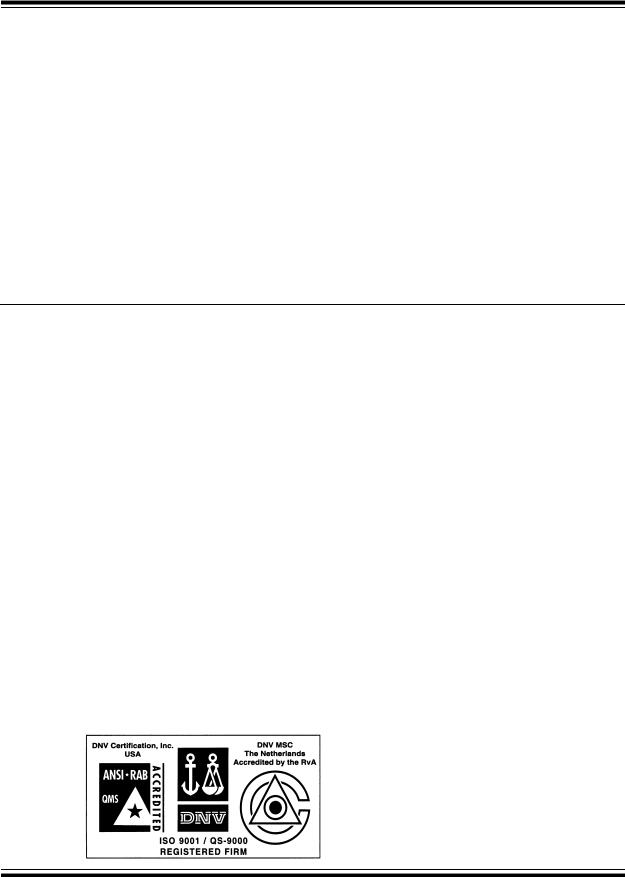
- •Introduction
- •Definition of Terms
- •Theory of Operation
- •Compression
- •Decompression
- •IMA ADPCM Reference Algorithm
- •Performance
- •Application
- •Computer Program
- •Conclusion
- •References:
- •Appendix A: ADPCMEncoder() Function
- •Appendix B: ADPCMDecoder() Function
- •Appendix G: PC ADPCM Encoder/Decoder Program

AN643
APPENDIX G: PC ADPCM ENCODER/DECODER PROGRAM
PCSPEECH.C
/***************************************************************************** * Filename: PCSPEECH.C *
******************************************************************************
* |
Author: |
Rodger Richey |
* |
* |
Title: |
Senior Applications Engineer |
* |
* |
Company: |
Microchip Technology Incorporated |
* |
* |
Revision: |
0 |
* |
* |
Date: |
1-11-96 |
* |
* |
Compiled using Borland C+ Version 3.1 |
* |
|
******************************************************************************
* |
Include files: |
* |
* |
stdio.h - Standard input/output header file |
* |
* |
stdlib.h - Standard library header file |
* |
* |
string.h - Standard string header file |
* |
* |
pcadpcm.h - ADPCM related information header file (Rev0) |
* |
******************************************************************************
* |
Usage: |
|
* |
* |
|
ADPCM Encode - pcspeech e <infile> <outfile> |
* |
* |
|
<infile> is a 16-bit raw speech file |
* |
* |
|
<outfile> contains the ADPCM codes |
* |
* |
|
ADPCM Decode - pcspeech d <infile> <outfile> |
* |
* |
|
<infile> contains the ADPCM codes |
* |
* |
|
<outfile> is a 16-bit raw speech file |
* |
******************************************************************************
* |
This file |
contains the code |
to: |
* |
||
* |
- |
Open the |
input and |
output files |
* |
|
* |
- |
Read data from the |
input file |
* |
||
* |
- |
Call the |
encode/decode routines |
* |
||
* |
- |
Write data to the |
output file |
* |
||
*****************************************************************************/
#include <stdio.h> #include <stdlib.h> #include <string.h> #include "pcadpcm.h"
/***************************************************************************** * Usage - this routine prints a how to message for the pcspeech prgm *
******************************************************************************
* |
Input variables: |
* |
* |
None |
* |
* |
Output variables: |
* |
* |
None |
* |
*****************************************************************************/
void Usage(void)
{
printf("ADPCM Encoder/Decoder -- usage:\n"); printf("\tEncoder = pcspeech e infile outfile\n"); printf("\tDecoder = pcspeech d infile outfile\n"); exit(1);
}
/***************************************************************************** * main - controls file I/O and ADPCM calls *
******************************************************************************
* |
Input variables: |
* |
* |
int argc - number of arguements in argv |
* |
* |
char **argv - pointer to an array of strings |
* |
* |
Return variables: |
* |
* |
None |
* |
*****************************************************************************/
void main(
int argc, char **argv)
1997 Microchip Technology Inc. |
DS00643B-page 33 |

AN643
{
int |
which; |
|
short |
|
sample; |
unsigned char |
code; |
|
int |
|
n; |
struct ADPCMstate |
state; |
|
FILE |
*fpin; |
|
FILE |
*fpout; |
|
state.prevsample=0;
state.previndex=0;
/* Determine if this is an encode or decode operation */ if(argc <= 1)
Usage();
else if( strcmp(argv[1],"e")==0 || strcmp(argv[1],"E")==0 ) which = 0;
else if( strcmp(argv[1],"d")==0 || strcmp(argv[1],"D")==0 ) which = 1;
argc--; argv++;
/* Open input file for processing */ if(argc <= 1)
Usage();
else if( (fpin=fopen(argv[1],"rb"))==NULL)
{
printf("ADPCM Encoder/Decoder\n");
printf("ERROR: Could not open %s for input\n",argv[1]); exit(1);
}
argc--; argv++;
/* Open output file */ if(argc <= 1)
{
fclose(fpin);
Usage();
}
else if( (fpout=fopen(argv[1],"wb"))==NULL)
{
fclose(fpin);
printf("ADPCM Encoder/Decoder\n");
printf("ERROR: Could not open %s for output\n",argv[1]); exit(1);
}
// ADPCM Decoder selected if(which)
{
printf("ADPCM Decoding in progress\n");
/* Read and unpack input codes and process them */ while (fread(&code, sizeof (char), 1, fpin) == 1)
{
//Send the upper 4-bits of code to decoder sample = ADPCMDecoder((code>>4)&0x0f, &state);
//Write sample for upper 4-bits of code fwrite(&sample, sizeof(short), 1, fpout);
//Send the lower 4-bits of code to decoder sample = ADPCMDecoder(code&0x0f,&state);
//Write sample for lower 4-bits of code fwrite(&sample,sizeof(short),1,fpout);
}
}
DS00643B-page 34 |
1997 Microchip Technology Inc. |

AN643
// ADPCM Encoder selected else
{
printf("ADPCM Encoding in progress\n"); /* Read input file and process */
while (fread(&sample, sizeof(short), 1, fpin) == 1)
{
//Encode sample into lower 4-bits of code code = ADPCMEncoder(sample,&state);
//Move ADPCM code to upper 4-bits
code = (code << 4) & 0xf0; // Read new sample from file
if(fread(&sample,sizeof(short),1,fpin)==0)
{
// No more samples, write code to file fwrite(&code,sizeof(char),1,fpout); break;
}
//Encode sample and save in lower 4-bits of code code |= ADPCMEncoder(sample,&state);
//Write code to file, code contains 2 ADPCM codes fwrite(&code, sizeof (char), 1, fpout);
}
}
fclose(fpin);
fclose(fpout);
}
PCADPCM.H
/***************************************************************************** * Filename: PCADPCM.H *
******************************************************************************
* |
Author: |
Rodger Richey |
* |
* |
Title: |
Senior Applications Engineer |
* |
* |
Company: |
Microchip Technology Incorporated |
* |
* |
Revision: |
0 |
* |
* |
Date: |
1-11-96 |
* |
* |
Compiled using Borland C+ Version 3.1 |
* |
|
******************************************************************************
*This is the header file that contains the ADPCM structure definition *
* and the function prototypes. *
*****************************************************************************/
struct ADPCMstate {
short prevsample;/* Predicted sample */
int previndex;/* Index into step size table */
};
/* Function prototype for the ADPCM Encoder routine */ char ADPCMEncoder(short , struct ADPCMstate *);
/* Function prototype for the ADPCM Decoder routine */ int ADPCMDecoder(char , struct ADPCMstate *);
PCADPCM.C
/***************************************************************************** * Filename: PCADPCM.C *
******************************************************************************
* |
Author: |
Rodger Richey |
* |
* |
Title: |
Senior Applications Engineer |
* |
* |
Company: |
Microchip Technology Incorporated |
* |
* |
Revision: |
0 |
* |
* |
Date: |
1-11-96 |
* |
* |
Compiled using Borland C+ Version 3.1 |
* |
|
1997 Microchip Technology Inc. |
DS00643B-page 35 |

AN643
******************************************************************************
* |
Include files: |
* |
* |
stdio.h - Standard input/output header file |
* |
* |
pcadpcm.h - ADPCM related information header file (Rev0) |
* |
******************************************************************************
* This file contains the ADPCM encode and decode routines. These *
*routines were obtained from the Interactive Multimedia Association's *
* |
Reference ADPCM algorithm. |
This algorithm was first implemented by * |
* |
Intel/DVI. |
* |
*****************************************************************************/
#include <stdio.h> #include "pcadpcm.h"
/* Table of index changes */ signed char IndexTable[16] = {
-1, -1, -1, -1, 2, 4, 6, 8, -1, -1, -1, -1, 2, 4, 6, 8,
};
/* Quantizer |
step size lookup table |
*/ |
|
|||||||
int StepSizeTable[89] = |
{ |
|
|
|
|
|||||
7, 8, |
9, |
10, |
11, |
12, |
13, |
14, 16, |
17, |
|
||
19, |
21, 23, |
25, |
28, |
31, 34, |
37, |
41, |
45, |
|||
50, |
55, 60, |
66, |
73, |
80, 88, |
97, |
107, 118, |
||||
130, 143, 157, |
173, |
190, |
209, |
230, |
253, |
279, |
307, |
||
337, 371, 408, |
449, |
494, |
544, |
598, |
658, |
724, |
796, |
||
876, 963, 1060, |
1166, |
1282, |
1411, 1552, |
1707, 1878, 2066, |
|||||
2272, |
2499, |
2749, |
3024, 3327, |
3660, |
4026, |
4428, |
4871, 5358, |
|||
5894, |
6484, |
7132, |
7845, 8630, |
9493, |
10442, |
11487, |
12635, 13899, |
|||
15289, |
16818, 18500, |
20350, |
22385, |
24623, |
27086, 29794, 32767 |
|||||
};
/***************************************************************************** * ADPCMEncoder - ADPCM encoder routine *
******************************************************************************
* |
Input variables: |
* |
* |
short sample - 16-bit signed speech sample |
* |
* |
struct ADPCMstate *state - ADPCM structure |
* |
* |
Return variables: |
* |
* |
char - 8-bit number containing the 4-bit ADPCM code |
* |
*****************************************************************************/
char ADPCMEncoder( short sample , struct ADPCMstate *state )
{
int code;/* ADPCM output value */
int diff;/* Difference between sample and the predicted sample */
int step;/* Quantizer step size */
int predsample;/* Output of ADPCM predictor */ int diffq;/* Dequantized predicted difference */ int index;/* Index into step size table */
/* Restore previous values of predicted sample and quantizer step size index
*/
predsample = (int)(state->prevsample); index = state->previndex;
step = StepSizeTable[index];
/* Compute the difference between the acutal sample (sample) and the the predicted sample (predsample)
*/
diff = sample - predsample; if(diff >= 0)
code = 0;
DS00643B-page 36 |
1997 Microchip Technology Inc. |

AN643
else
{
code = 8; diff = -diff;
}
/* Quantize the difference into the 4-bit ADPCM code using the the quantizer step size
*/
/* Inverse quantize the ADPCM code into a predicted difference using the quantizer step size
*/
diffq = step >> 3; if( diff >= step )
{
code |= 4; diff -= step; diffq += step;
}
step >>= 1;
if( diff >= step )
{
code |= 2; diff -= step; diffq += step;
}
step >>= 1;
if( diff >= step )
{
code |= 1; diffq += step;
}
/* Fixed predictor computes new predicted sample by adding the old predicted sample to predicted difference
*/
if( code & 8 ) predsample -= diffq;
else
predsample += diffq;
/* Check for overflow of the new predicted sample */
if( predsample > 32767 ) predsample = 32767;
else if( predsample < -32767 ) predsample = -32767;
/* Find new quantizer stepsize index by adding the old index to a table lookup using the ADPCM code
*/
index += IndexTable[code];
/* Check for overflow of the new quantizer step size index */
if( index < 0 ) index = 0;
if( index > 88 ) index = 88;
/* Save the predicted sample and quantizer step size index for next iteration
*/
state->prevsample = (short)predsample; state->previndex = index;
1997 Microchip Technology Inc. |
DS00643B-page 37 |

AN643
/* Return the new ADPCM code */
return ( code & 0x0f );
}
/***************************************************************************** * ADPCMDecoder - ADPCM decoder routine *
******************************************************************************
* |
Input variables: |
* |
* |
char code - 8-bit number containing the 4-bit ADPCM code |
* |
* |
struct ADPCMstate *state - ADPCM structure |
* |
* |
Return variables: |
* |
* |
int - 16-bit signed speech sample |
* |
*****************************************************************************/
int ADPCMDecoder(char code, struct ADPCMstate *state)
{
int step;/* Quantizer step size */
int predsample;/* Output of ADPCM predictor */ int diffq;/* Dequantized predicted difference */ int index;/* Index into step size table */
/* Restore previous values of predicted sample and quantizer step size index
*/
predsample = (int)(state->prevsample); index = state->previndex;
/* Find quantizer step size from lookup table using index */
step = StepSizeTable[index];
/* Inverse quantize the ADPCM code into a difference using the quantizer step size
*/
diffq = step >> 3; if( code & 4 )
diffq += step; if( code & 2 )
diffq += step >> 1; if( code & 1 )
diffq += step >> 2;
/* Add the difference to the predicted sample */
if( code & 8 ) predsample -= diffq;
else
predsample += diffq;
/* Check for overflow of the new predicted sample */
if( predsample > 32767 ) predsample = 32767;
else if( predsample < -32767 ) predsample = -32767;
/* Find new quantizer step size by adding the old index and a table lookup using the ADPCM code
*/
index += IndexTable[code];
/* Check for overflow of the new quantizer step size index */
if( index < 0 ) index = 0;
if( index > 88 )
DS00643B-page 38 |
1997 Microchip Technology Inc. |

AN643
index = 88;
/* Save predicted sample and quantizer step size index for next iteration
*/
state->prevsample = (short)predsample; state->previndex = index;
/* Return the new speech sample */ return( predsample );
}
1997 Microchip Technology Inc. |
DS00643B-page 39 |

Note the following details of the code protection feature on PICmicro® MCUs.
•The PICmicro family meets the specifications contained in the Microchip Data Sheet.
•Microchip believes that its family of PICmicro microcontrollers is one of the most secure products of its kind on the market today, when used in the intended manner and under normal conditions.
•There are dishonest and possibly illegal methods used to breach the code protection feature. All of these methods, to our knowledge, require using the PICmicro microcontroller in a manner outside the operating specifications contained in the data sheet. The person doing so may be engaged in theft of intellectual property.
•Microchip is willing to work with the customer who is concerned about the integrity of their code.
•Neither Microchip nor any other semiconductor manufacturer can guarantee the security of their code. Code protection does not mean that we are guaranteeing the product as “unbreakable”.
•Code protection is constantly evolving. We at Microchip are committed to continuously improving the code protection features of our product.
If you have any further questions about this matter, please contact the local sales office nearest to you.
Information contained in this publication regarding device applications and the like is intended through suggestion only and may be superseded by updates. It is your responsibility to ensure that your application meets with your specifications. No representation or warranty is given and no liability is assumed by Microchip Technology Incorporated with respect to the accuracy or use of such information, or infringement of patents or other intellectual property rights arising from such use or otherwise. Use of Microchip’s products as critical components in life support systems is not authorized except with express written approval by Microchip. No licenses are conveyed, implicitly or otherwise, under any intellectual property rights.
Trademarks
The Microchip name and logo, the Microchip logo, FilterLab, KEELOQ, microID, MPLAB, PIC, PICmicro, PICMASTER, PICSTART, PRO MATE, SEEVAL and The Embedded Control Solutions Company are registered trademarks of Microchip Technology Incorporated in the U.S.A. and other countries.
dsPIC, ECONOMONITOR, FanSense, FlexROM, fuzzyLAB, In-Circuit Serial Programming, ICSP, ICEPIC, microPort, Migratable Memory, MPASM, MPLIB, MPLINK, MPSIM, MXDEV, PICC, PICDEM, PICDEM.net, rfPIC, Select Mode and Total Endurance are trademarks of Microchip Technology Incorporated in the U.S.A.
Serialized Quick Turn Programming (SQTP) is a service mark of Microchip Technology Incorporated in the U.S.A.
All other trademarks mentioned herein are property of their respective companies.
© 2002, Microchip Technology Incorporated, Printed in the U.S.A., All Rights Reserved.
 Printed on recycled paper.
Printed on recycled paper.
Microchip received QS-9000 quality system certification for its worldwide headquarters, design and wafer fabrication facilities in Chandler and Tempe, Arizona in July 1999. The Company’s quality system processes and procedures are QS-9000 compliant for its PICmicro® 8-bit MCUs, KEELOQ® code hopping devices, Serial EEPROMs and microperipheral products. In addition, Microchip’s quality system for the design and manufacture of development systems is ISO 9001 certified.
2002 Microchip Technology Inc.

M
WORLDWIDE SALES AND SERVICE
AMERICAS
Corporate Office
2355 West Chandler Blvd.
Chandler, AZ 85224-6199
Tel: 480-792-7200 Fax: 480-792-7277 Technical Support: 480-792-7627
Web Address: http://www.microchip.com
Rocky Mountain
2355 West Chandler Blvd.
Chandler, AZ 85224-6199
Tel: 480-792-7966 Fax: 480-792-7456
Atlanta
500 Sugar Mill Road, Suite 200B
Atlanta, GA 30350
Tel: 770-640-0034 Fax: 770-640-0307
Boston
2 Lan Drive, Suite 120
Westford, MA 01886
Tel: 978-692-3848 Fax: 978-692-3821
Chicago
333 Pierce Road, Suite 180
Itasca, IL 60143
Tel: 630-285-0071 Fax: 630-285-0075
Dallas
4570 Westgrove Drive, Suite 160
Addison, TX 75001
Tel: 972-818-7423 Fax: 972-818-2924
Detroit
Tri-Atria Office Building
32255 Northwestern Highway, Suite 190
Farmington Hills, MI 48334
Tel: 248-538-2250 Fax: 248-538-2260
Kokomo
2767 S. Albright Road
Kokomo, Indiana 46902
Tel: 765-864-8360 Fax: 765-864-8387
Los Angeles
18201 Von Karman, Suite 1090
Irvine, CA 92612
Tel: 949-263-1888 Fax: 949-263-1338
New York
150 Motor Parkway, Suite 202
Hauppauge, NY 11788
Tel: 631-273-5305 Fax: 631-273-5335
San Jose
Microchip Technology Inc.
2107 North First Street, Suite 590
San Jose, CA 95131
Tel: 408-436-7950 Fax: 408-436-7955
Toronto
6285 Northam Drive, Suite 108
Mississauga, Ontario L4V 1X5, Canada
Tel: 905-673-0699 Fax: 905-673-6509
ASIA/PACIFIC
Australia
Microchip Technology Australia Pty Ltd
Suite 22, 41 Rawson Street
Epping 2121, NSW
Australia
Tel: 61-2-9868-6733 Fax: 61-2-9868-6755
China - Beijing
Microchip Technology Consulting (Shanghai)
Co., Ltd., Beijing Liaison Office
Unit 915
Bei Hai Wan Tai Bldg.
No. 6 Chaoyangmen Beidajie
Beijing, 100027, No. China
Tel: 86-10-85282100 Fax: 86-10-85282104
China - Chengdu
Microchip Technology Consulting (Shanghai)
Co., Ltd., Chengdu Liaison Office
Rm. 2401, 24th Floor,
Ming Xing Financial Tower
No. 88 TIDU Street
Chengdu 610016, China
Tel: 86-28-6766200 Fax: 86-28-6766599
China - Fuzhou
Microchip Technology Consulting (Shanghai)
Co., Ltd., Fuzhou Liaison Office
Unit 28F, World Trade Plaza
No. 71 Wusi Road
Fuzhou 350001, China
Tel: 86-591-7503506 Fax: 86-591-7503521
China - Shanghai
Microchip Technology Consulting (Shanghai)
Co., Ltd.
Room 701, Bldg. B
Far East International Plaza
No. 317 Xian Xia Road
Shanghai, 200051
Tel: 86-21-6275-5700 Fax: 86-21-6275-5060
China - Shenzhen
Microchip Technology Consulting (Shanghai)
Co., Ltd., Shenzhen Liaison Office
Rm. 1315, 13/F, Shenzhen Kerry Centre,
Renminnan Lu
Shenzhen 518001, China
Tel: 86-755-2350361 Fax: 86-755-2366086
Hong Kong
Microchip Technology Hongkong Ltd.
Unit 901-6, Tower 2, Metroplaza
223 Hing Fong Road
Kwai Fong, N.T., Hong Kong
Tel: 852-2401-1200 Fax: 852-2401-3431
India
Microchip Technology Inc.
India Liaison Office
Divyasree Chambers
1 Floor, Wing A (A3/A4)
No. 11, O’Shaugnessey Road
Bangalore, 560 025, India
Tel: 91-80-2290061 Fax: 91-80-2290062
Japan
Microchip Technology Japan K.K.
Benex S-1 6F
3-18-20, Shinyokohama
Kohoku-Ku, Yokohama-shi
Kanagawa, 222-0033, Japan
Tel: 81-45-471- 6166 Fax: 81-45-471-6122
Korea
Microchip Technology Korea
168-1, Youngbo Bldg. 3 Floor
Samsung-Dong, Kangnam-Ku
Seoul, Korea 135-882
Tel: 82-2-554-7200 Fax: 82-2-558-5934
Singapore
Microchip Technology Singapore Pte Ltd.
200 Middle Road
#07-02 Prime Centre
Singapore, 188980
Tel: 65-334-8870 Fax: 65-334-8850
Taiwan
Microchip Technology Taiwan
11F-3, No. 207
Tung Hua North Road
Taipei, 105, Taiwan
Tel: 886-2-2717-7175 Fax: 886-2-2545-0139
EUROPE
Denmark
Microchip Technology Nordic ApS Regus Business Centre
Lautrup hoj 1-3
Ballerup DK-2750 Denmark
Tel: 45 4420 9895 Fax: 45 4420 9910
France
Microchip Technology SARL
Parc d’Activite du Moulin de Massy 43 Rue du Saule Trapu
Batiment A - ler Etage 91300 Massy, France
Tel: 33-1-69-53-63-20 Fax: 33-1-69-30-90-79
Germany
Microchip Technology GmbH
Gustav-Heinemann Ring 125
D-81739 Munich, Germany
Tel: 49-89-627-144 0 Fax: 49-89-627-144-44
Italy
Microchip Technology SRL
Centro Direzionale Colleoni Palazzo Taurus 1 V. Le Colleoni 1 20041 Agrate Brianza
Milan, Italy
Tel: 39-039-65791-1 Fax: 39-039-6899883
United Kingdom
Arizona Microchip Technology Ltd. 505 Eskdale Road
Winnersh Triangle Wokingham
Berkshire, England RG41 5TU
Tel: 44 118 921 5869 Fax: 44-118 921-5820
01/18/02
2002 Microchip Technology Inc.
